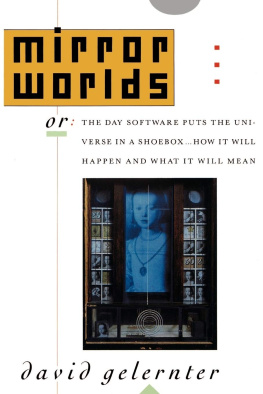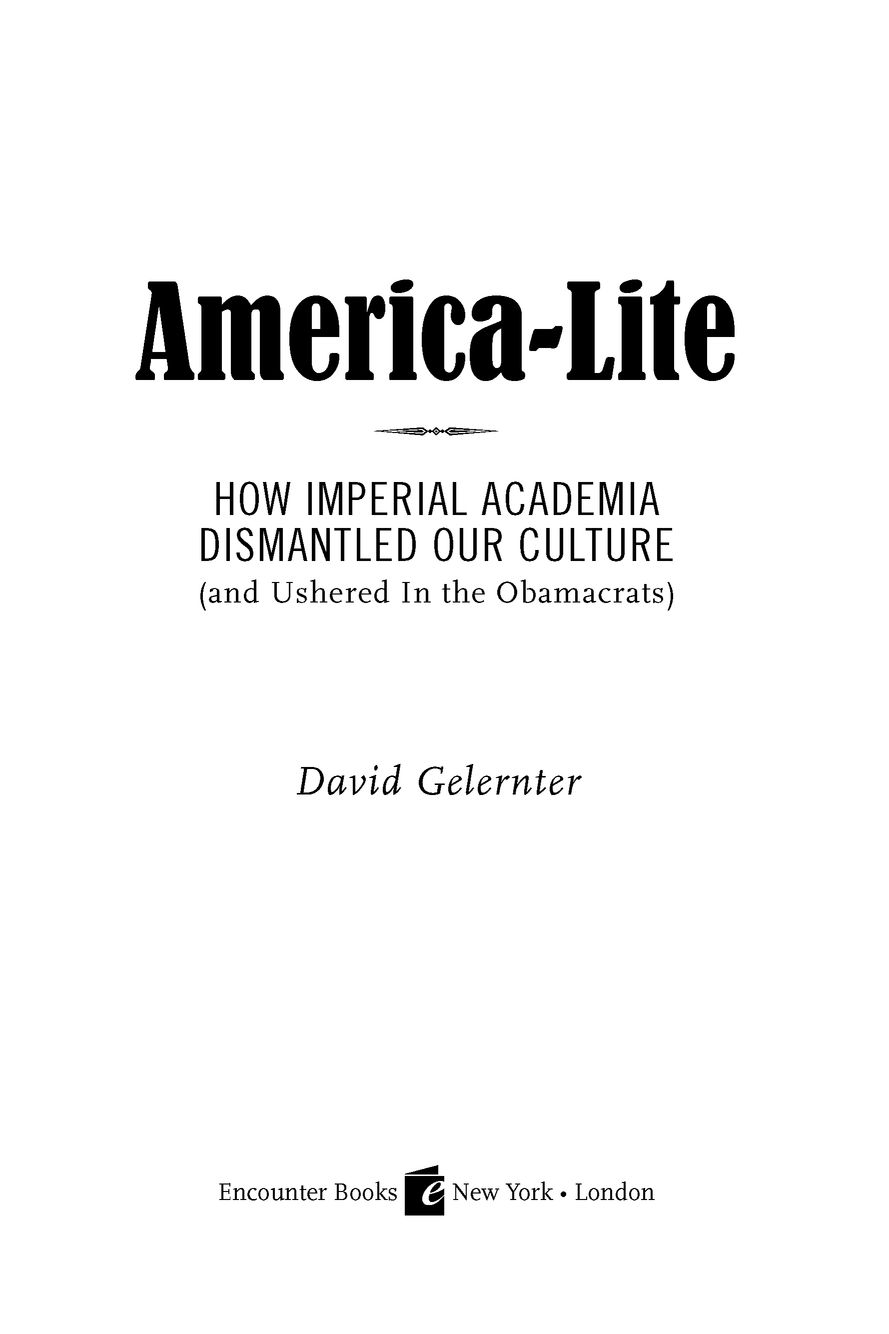Table of Contents
For my Jane, my mother and my father
Acknowledgments
MANY THANKS TO GLEN LOWRY AND LYNN CHU FOR HELPING TO INVENT THIS book, and to Encounter Books and especially Roger Kimball for being patient and accommodating far above and beyond the call of duty. Thanks most of all to my brilliant editor Carol Staswick for pounding the manuscript into shape.
prologue
Before and After
EVERYONE KNOWS THAT AMERICAN CIVILIZATION CHANGED IN THE 1960S and 70s. When President Obamas generation reached adulthood in the 1980s and afterward, the nation had altered fundamentally from the one in which their parents grew up. A revolution in American culture had transformed the landscape. Lets take a quick tour around this cultural revolutionglance it over from outside. Then we will stop the bus and get off and look deeper.
Before the cultural revolution, it was taken for granted that instilling patriotism was a duty of every U.S. public school. After the revolution, ROTC disappeared entirely from the Ivy League, not to return until 2011.
Before the cultural revolution, America was assumed to be a Christian or Judeo-Christian society. As Britain struggled against Nazi Germany in 1940, President Roosevelt said in a radio address, Today the whole world is divided between human slavery and human freedom-between pagan brutality and the Christian ideal.
Before the cultural revolution, police duties used to be described as protecting the citizenry from crime and vice. See you in church meant see you around. Red-blooded American was used routinely and without irony, as in: Hemingway and Steinbeck are red-blooded American authors.
Before the cultural revolution, literature, music and fine arts were increasingly the property not only of the rich but of the educated middle classes. When John Kennedy invited Robert Frost to read a poem at his inauguration, Frosts poetry was known all over the English-speaking world. Frost himself was a first-rate international celebrity, along with other big-league artists. A Hemingway or Calder, a Leonard Bernstein or Copland or Picasso was respected in the art world, but all these men were top-draw celebrities also. Today, virtually no one outside the arts community knows of a living poet, painter or classical composer.
Before the cultural revolution, there was no sex education in public schools. Sex and sexuality (including homosexuality) were inappropriate topics for classroom discussion in high school, not to mention the lower grades. Before the cultural revolution, access to birth control was restricted, in theory, to married couples. The legal status of abortion was regulated separately by each state.
Before the cultural revolution, there were no coed college dormitories with young men and women living in bedrooms on the same floor. Before the cultural revolution, visiting between men and women students on campus was regulated by parietals, which limited male visiting in female dormitories to certain times, and usually required girls to return to their dormitories by set hours and to sign out before leaving for the evening, listing their destinations or plans. When men visited women in their rooms or vice versa, the three on the floor rule came into play: the door must always be open and there must be three feet on the floor the whole time.
(I remember learning about parietals, when I was a young teenager, from a college student who had witnessed their abolition with satisfaction. He was a counselor at tennis camp, a type of summer camp where you did nothing but play tennis all day long, grunting occasionally as needed; no nonsense about tents or kayaks or campfires. In the late 1960s, you wore white on the courtsnot pale buff, not powder blue; white.)
Modern commentators are apt to express routine anger that girls were regulated so much more strictly than boys. But the colleges were legally in loco parentis, in the parents place, until court decisions in the 1960s and 70s freed them from this tight spot; and they set a more careful watch on girls because girls were more vulnerable than boys, more likely to be abused. Do modern liberals deny that women are more likely to be abused? They like to believe that the sexes are interchangeable. And theyd also like to believe that crimes committed by men against women are a much worse problem than crimes committed by women against menwhich is only common sense. But you cant have it both ways. Are we interchangeable or not?
The destruction of the etiquette that used to govern relations between men and women, along with many other rules of the social road, is one of the deepest, darkest consequences of the revolution, and one of the least understood. Of course, custom and etiquette evolve constantly, and new customs arise to replace old ones. But it takes many years for new and natural customs to emerge. How else but in custom and in ceremony / are innocence and beauty born? (Yeats.)
The deliberate smashing of etiquette in the wake of Americas cultural revolutioneveryone please toss your ancient crystal stemware that way, straight into the fireplace, thank you!reminds one of similar destructive acts early in the French and Soviet revolutions. The French quickly returned to their old ways (think left, live right, say the French, dropping their principles in the trash on the way out), whereas post-Soviet Russia remains a lawless and dangerous society. America, on the other hand, still has two deep reservoirs of manners and etiquette: the military and some conservative churches. America is always a special case, and this story is not over yet.
What many observers fail to consider when they shrug off or laugh off the protocols that used to govern social relations, especially between men and women, is that good manners and proper etiquette are names for formal behavior. And everyone carries out formal rules in approximately the same way. Formal behavior is rehearsed. Informal or unmannerly behavior is improvised, unrehearsed. Because it is unrehearsed and improvised, it reveals personality in a way that formal behavior never can. Mannerly, formal behavior is a screen protecting from view the informal, improvised behavior that is self-revealing.
Do not expose your private affairs, feelings or innermost thoughts in public. You are knocking down the walls of your house when you do. (Emily Post, Etiquette, 1940.)
In assaulting the protective shell provided by etiquette or good manners, the cultural revolution and its consequences promoted the destruction of privacy; in fact, of the whole idea of privacy. The internet, too, makes it easy to party naked. The extent to which young people responded to the internet by voluntarily stripping off their privacy is startling. But it wouldnt have happenednot to the same extentif the revolution hadnt prepared the way. Andrew Ferguson recently wrote about the mainstream presss incomprehension of Donald Rumsfeld, who was unwilling to reveal his innermost emotions in public, even while being interviewed by the highest-paid talent on television. Bitter old man.
Before the cultural revolution, ones elders and those in authority were sometimes addressed as Sir, Madam, Miss. First names were used ordinarily by permission, among friends. College teachers called their students Mr. Robinson, Miss Whitney, as if they were grownups. These small touches gave society a more formal and therefore a more private tone.










